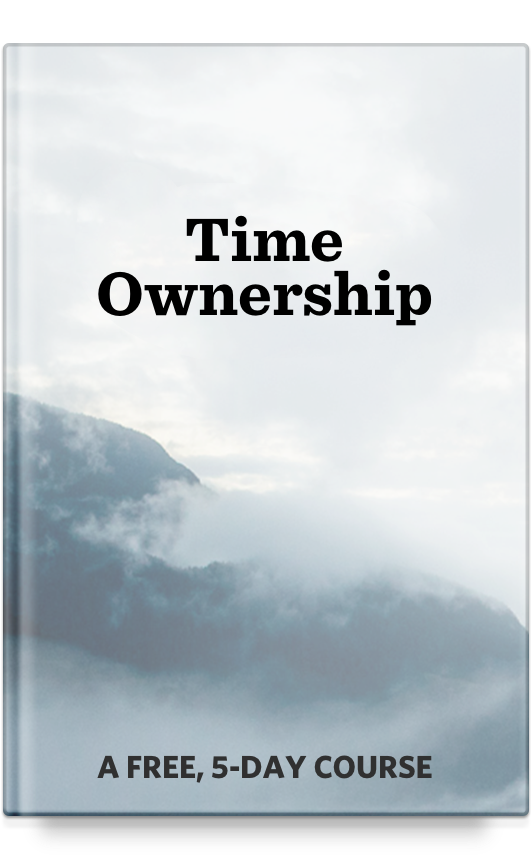Downtown Boise is wonderful.
This was my first time there, and I was amazed at how fantastic the downtown area was. It’s easy and fun to walk around, and there are tons of great restaurants and coffee shops.
The reason I was in Boise was for the first Craft + Commerce conference hosted by ConvertKit.
When the conference was first announced, just a few months ago, I already had plans to be in Colorado. But many of my friends were going to be there…
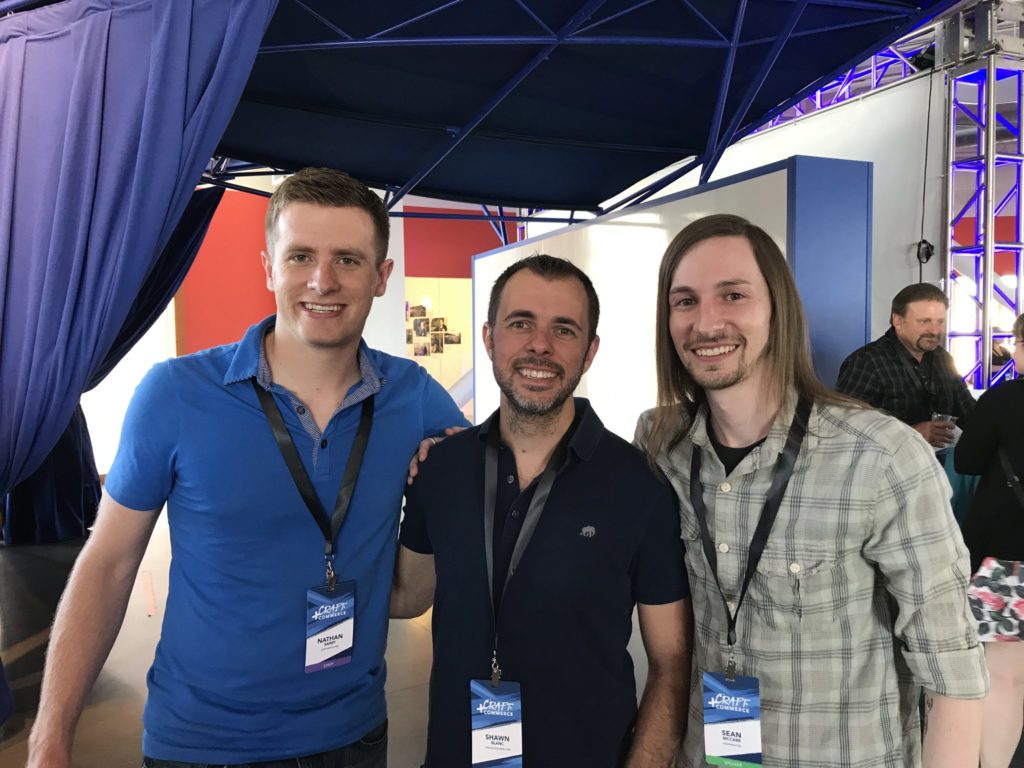
In a nut the conference was about this…
Take joy in your art. Be diligent in your work.
If someone were to dig a hole, plant a copy of The War of Art, and water it, and then if it sprouted and grew into a conference, then this would be that conference.
Not only in theme, but also in style. If you’ve read The War of Art then you know how it’s equal parts inspiration and punches to the gut while being quick paced (some chapters are only a few sentences).
Craft + Commerce was the exact same way. All the main stage sessions were quick and punchy (most were only 20 minutes long). But it never felt rushed.
Needless to say, I’m super impressed and proud of Barrett, Alexis, Nathan, and the whole ConvertKit crew who orchestrated and pulled off this event.
I took voracious notes during many of the sessions, and wanted to share them here with you. Below are my notes and takeaways from a few of the main stage presentations. Enjoy.
Chase Reeves: Find Joy Now
So many creative folks are doing amazing things but they feel like crap about the work they do; they feel like a fraud.
Comparison steals our joy. Which means your joy can be stolen from you.
And that’s bad news, because your joy is what makes you authentic, fun, and compelling. Joy liberates you to do your best work and to make something that matters and that is unique.
You won’t feel joy then if you can’t start feeling it now. You won’t feel joy in your moments of success if you don’t also feel joy during the journey and process.
So often, when we talk about success, it’s actually the feeling of success that we are looking forward to. And to make sure you feel successful in that moment, here are a few things you can do now…
- Define Success: You have to know how to define your own success. Do that by writing down how you want success to feel. (See Fizzle Show ep. 140)
- Be Grateful — Focusing on gratitude helps you enjoy the journey.
- Be Courageous — take one small step at a time and keep going.
James Clear: Get 1% Better Every Day
Don’t underestimate the aggregation of marginal gains.
Doing little things — small improvements and tiny habits — are the key to transformation.
There are four stages of habit formation:
1. Noticing
2. Wanting
3. Doing
4. Liking
Noticing…
First you have to notice something is even an option. It’s hard to change something if you’re not aware of it.
Then, you need a specific plan. This is massively important. Why? Because many people think they lack motivation when what they actually lack is a plan.
Your plan should have the what, when, where, and how of your intentions. Give your goals a time and place in the world. They need to live on your calendar. By doing so you drastically increase your chances of following through with your intentions.
Wanting…
Your environment can impact your desires and your choices. Fortunately you can shape your own environment.
Lower and raise the activation energy required for good and bad habits respectively. Hardly anyone can stick to positive habits on a consistent basis when they are in a negative environment.
Doing…
In the beginning, what matters most is getting going and doing the repetition. Focus on quantity rather than quality.
Every time you do a habit you move forward toward the goal / outcome you want. Thus you have to make it as easy as possible to start.
Which means you should optimize for the starting line, rathe than the finish line. Focus on getting started not finishing. Because once you’ve gotten started, momentum will carry you further than you think. If you spend all your energy focusing on what it will look like to finish, you may never even get started in the first place.
Liking…
We repeat behaviors because we like the reward. Alas, good habits usually have delayed gratification and bad habits have an immediate reward.
“The best way to change long-term behavior is with short term feedback.” — Seth Godin
Increase your enjoyment of good behavior by tracking and celebrate your small progress. (Don’t break the chain; never miss twice.)
The whole idea behind the importance of tiny habits is that they increase your quality of life and actually change your identity.
The goal is not behavior change, the goal is identity change. And since you become by doing — you are what you do repeatedly — you can, quite literally, change your life by changing your habits.
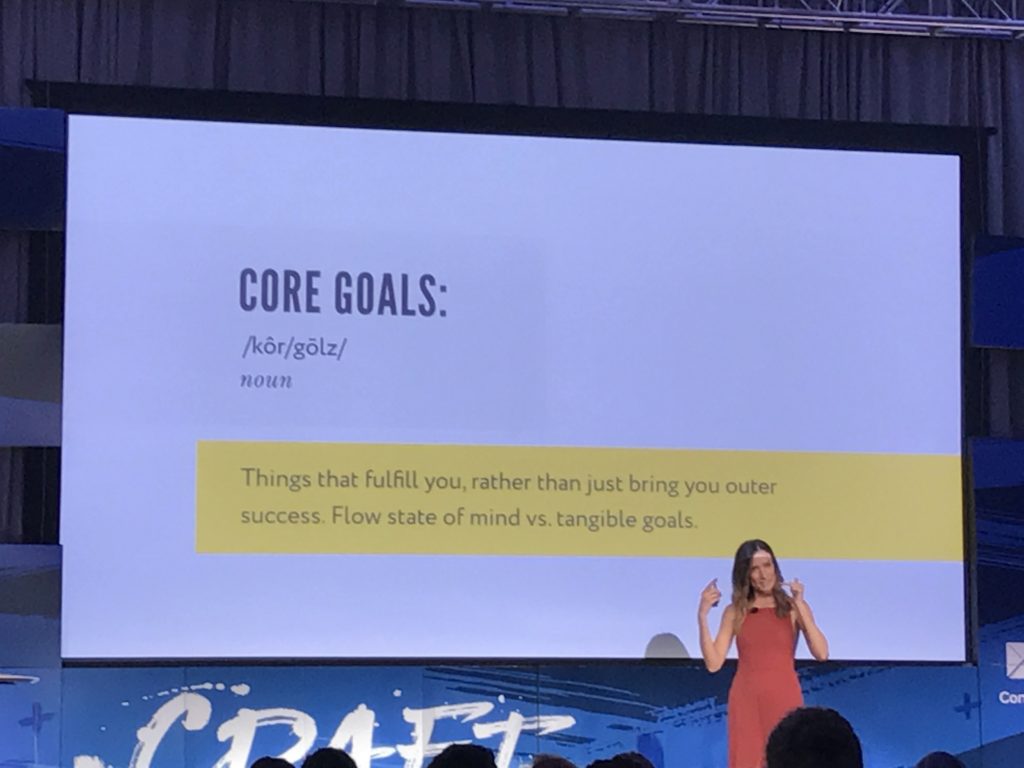
Melyssa Griffin: Purpose Driven Business
Many people focus on outer goals. Such as: making more money, growing your audience, becoming well known, and having nice things.
These are neat, but they should not define your success or identity.
Moreover, the finish line for these goals keeps moving. For example: once you’ve grown your audience to 10,000 know you have to grow it to 20,000, and so on… Which means when you do reach these goals they’re not very fulfilling.
Instead, you need to first focus on your core goals — what actually matters to your life and your values and your vision.
When you do this, your business stops being about your own personal gains and it starts being about serving others. Not only in the products and services you sell, but also in other ways — using your business as a vehicle for serving others.
Ways to give back:
- Start by evaluating if you are truly living your purpose. Take a hard look and then be courageous enough to make a change.
- Use your platform for good. Talk about the issue that are important to you. Integrity isn’t found in silence. Be vulnerable and honest.
- Start where you are. Don’t despise small beginnings; give any way you can.
Sean McCabe: Start a Writing Habit
Building a writing habit is the best thing you can do for your career.
To thrive online, you have to occupy the spot between artist and business. And, if you’re not making sales in your sleep, in the age of the internet, then you’re doing it wrong.
The aim of writing is to teach what you know.
Which, implies that you should not teach what you don’t know. Many people feel like frauds because they think they should teach things they don’t even know. That’s silly. Teach what you do know.
You need to write in order to make a name for yourself. In order to make a business. Write every day. Word count doesn’t matter. The habit does.
The reason you don’t write is because you think you have nothing to say. But when you write you will discover what to say. You can’t improve what you haven’t written before. Get the material out first, and THEN edit.
To start writing try doing it as the first thing you do in the morning.
Such as morning pages. Just write a stream of consciousness. Write now and edit later.
To keep up your writing habit you need to (a) minimize distractions; and (b) eliminate interruptions — including the possibility of interruptions so they are not in the back of your mind.
To stay consistent, you need an editorial calendar. Ideally you are publishing at least once per week. This way you can get inside people’s weekly cycle.
It will also help to get a content buffer, so you are not staying up late to write things at the last minute.
Don’t shy away from repurposing your content. Replay your best hits. Share what you learn. Teach what you know.
Nicole Walters
Those who specialize in excuses are seldom good at anything else.
Focus on impact, instead. Who are you trying to help?
Don’t do free. You’re worth it. You invest your time and money in your business and you want to continue living in your purpose. You’re a business so act like one.
Do the work. Have the best work ethic. Take the initiative. Be the most intentional and proactive. Do what you say you’ll do. Be consistent.
Automate systems, not relationships. You’re in the business of people. Efficiency won’t replace empathy. Engagement is king. The personal connection cannot be replaced.
Disrupt, don’t duplicate. Be authentic, and do what brings you joy. Innovate. 1 Peter 4:10
You are not Kim Kardashian. You cannot just take selfies of yourself and expect your audience to grow. You have to do the work, serve, build relationships, get in the trenches, don’t be too good for others or for any kind of work. Give your very best. And when you get the chance to be in the spotlight, deliver your best work.
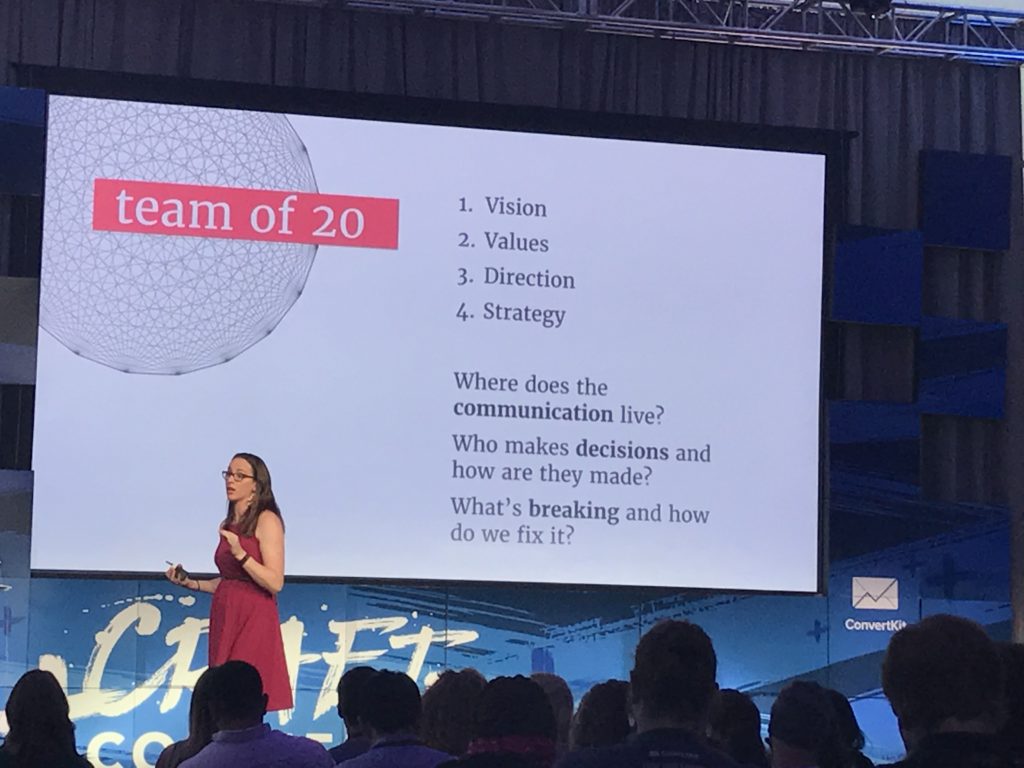
Sarah Kathleen Peck: Pregnancy and Startup Life
Don’t confuse strategy with vision. And don’t build your strategy without first defining your vision and values and direction.
As your company is changing and growing, you have to let go of old habits and implement new ones.
Realize that as your company grows, you will change, and so too will your employees.
Go make the work and let the work make you in the process. Don’t wait to get started, because you can’t know everything before you begin.
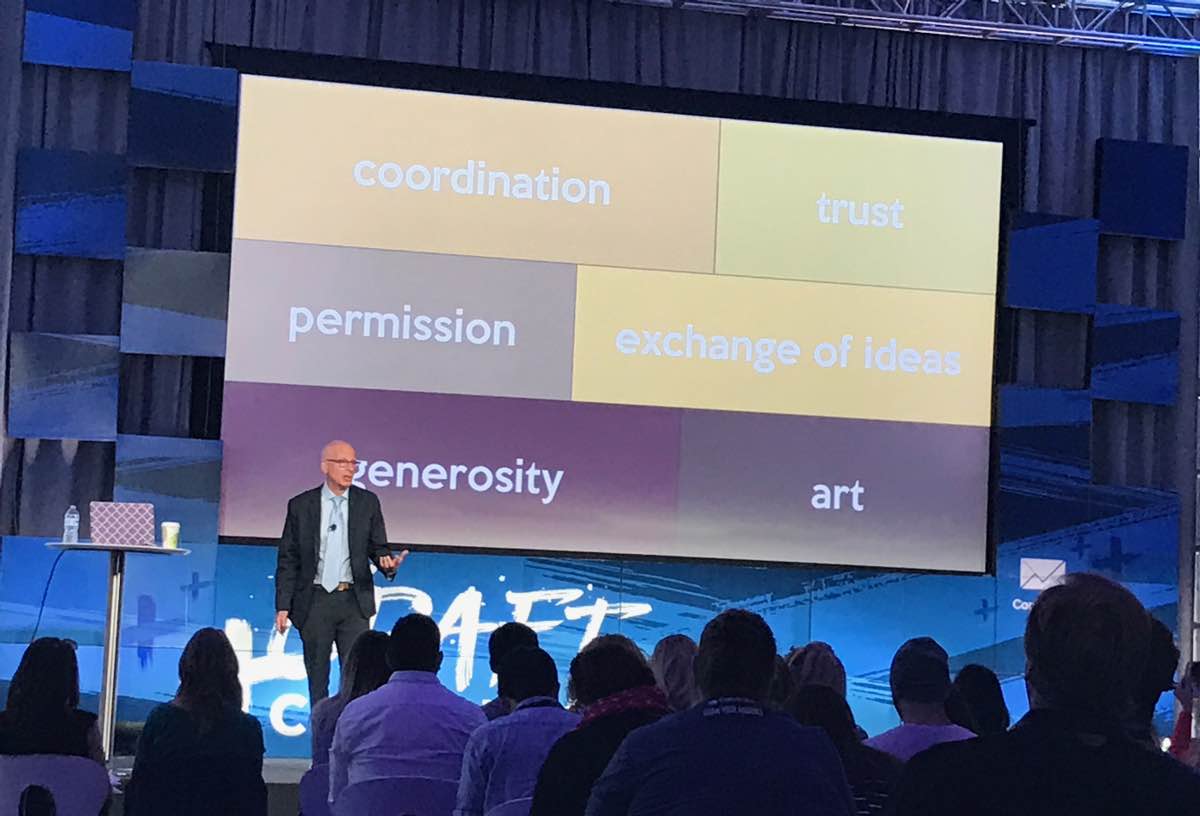
Seth Godin
Don’t focus on the external to change the internal. Focus on the internal to change the external.
All the systems are changing. Music. Publishing. Etc. Mass marketing was and is for the mass market. Thus it can only promote products that are average. If you don’t want to promote an average product, don’t worry about mass marketing. Most of the people we are trying to reach don’t know they even have a problem and they’re not even paying attention anyway.
The good news is that thanks to the internet, everyone can be your customer. But the bad news is that everyone can also be your competitor.
To reach your best fans, you have to sell more than an average product. You have to sell them a new identity. And offer them transformation. And that will bring about loyalty.
The only way to be special is to not be average. And the only way to not be average is to ignore everyone else.
Stand out from the crowd by targeting the smallest possible audience. (Not the smallest audience, but the smallest possible audience.)
Make stuff for weird people. People at the edges of the curve — not those in the middle.
And you make it for them by building a tribe and then saying…
People like us do things like this.
Art = doing something that might not work that connects people and tells a story.
Not art = copying an artist.
What’s your best work for? It’s for changing people. But your pursuit of that change brings a massive tension. You have to be okay working with that tension. You have to be okay building something that might not work. Because if failure is not an option then neither is success. (And sometimes the two go hand in hand… the man who invented the ship also invented the shipwreck.)
There is a huge difference between being ready and being prepared…
You are already prepared, but you’ll never ready.
